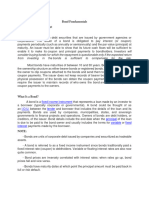0 ratings0% found this document useful (0 votes)
4 viewsREVIEWER IN GENERAL MATHEMATICS
REVIEWER IN GENERAL MATHEMATICS
Uploaded by
celeneagalotCopyright:
© All Rights Reserved
Available Formats
Download as DOCX, PDF, TXT or read online from Scribd
REVIEWER IN GENERAL MATHEMATICS
REVIEWER IN GENERAL MATHEMATICS
Uploaded by
celeneagalot0 ratings0% found this document useful (0 votes)
4 views2 pagesCopyright
© © All Rights Reserved
Available Formats
DOCX, PDF, TXT or read online from Scribd
Share this document
Did you find this document useful?
Is this content inappropriate?
Copyright:
© All Rights Reserved
Available Formats
Download as DOCX, PDF, TXT or read online from Scribd
Download as docx, pdf, or txt
0 ratings0% found this document useful (0 votes)
4 views2 pagesREVIEWER IN GENERAL MATHEMATICS
REVIEWER IN GENERAL MATHEMATICS
Uploaded by
celeneagalotCopyright:
© All Rights Reserved
Available Formats
Download as DOCX, PDF, TXT or read online from Scribd
Download as docx, pdf, or txt
You are on page 1of 2
REVIEWER IN GENERAL MATHEMATICS (2ND QUARTER)
The amount paid for the use of money is called interest.
Simple interest is applied only to the principal amount.
Compound interest is applied both to the principal amount and the accumulated
interest.
Simple interest is the computed return from the present value for a given
duration of a transaction.
Maturity value (future value) is the total amount to be received or paid for a
certain obligation.
Present value is the amount being borrowed or the amount being invested.
Compound interest is the sum which represents the increase in the original
principal at the end of the
term.
Compound amount is the result when the interest is added to the principal
periodically and their sum
becomes the principal for the following period.
An annuity is a sequence of equal payments made at equal intervals of time.
The interval between consecutive payments is called the payment interval. The
interval may be
monthly,
bimonthly, quarterly, semiannually
, and
annually
.
The term of an annuity is the time from the beginning of the first payment
interval through the day of the
last payment.
Simple annuity is an annuity in which the payment interval is equal to the
compounding period.
General annuity is an annuity in which the payment interval is different from the
compounding period.
Present value is the amount of money required in the beginning.
Future value is the sum of the accumulated values of the periodic payments at
the end of the term.
If the payment is made at the end of each payment interval, it is an ordinary
annuity.
If the payment is made at the beginning of each payment interval, it is an
annuity due.
Ordinary general annuity is a general annuity in which payments are made at the
end of the payment
period with different payment interval and compounding interval.
General annuity due is a general annuity in which payments are made at the
beginning of the payment
period with different interval and compounding interval.
The fair market value of a cash flow stream on a particular date refers to a single
amount that is a fair
market substitute for the cash flow stream.
Cash flow is a term that refers to payments that can be either inflows (payments
received) or outflows
(payments made).
Deferred annuity is an annuity in which the first payment interval is not made at
the beginning nor end of
the payment interval, but at a later date.
Deferral period is the length of time from the present to the beginning of the first
payment interval.
Present value is the amount of money to be invested or to be paid today.
Stocks are referred as equity when a person who buys a stock is buying an
actual share of the company,
which makes him or her a part owner.
Bonds are debt equity or security in which the authorized guarantor owes the
holders an obligation and is
obliged to repay the principal and interest.
A stock market is a place where you can buy or sell stocks publicly from various
listed companies.
Consumer loans are loans that are extended to people for personal or household
use.
Business loans are loans specifically intended for business purposes.
A proposition is a declarative sentence which is true or false but not both.
Simple propositions are simple statements that can be decided whether true or
false.
You might also like
- Electricity Duty ExemptionDocument8 pagesElectricity Duty ExemptionGlobal Industrial SolutionsNo ratings yet
- Comparison Chart Key Differences ConclusionDocument4 pagesComparison Chart Key Differences ConclusionTrixy 00No ratings yet
- Genmath q2 TeminologiesDocument5 pagesGenmath q2 TeminologiesrxchilibirjNo ratings yet
- Finance PaperDocument2 pagesFinance PaperSyed Danyal ShahNo ratings yet
- FM MidDocument4 pagesFM MidImtiaz SultanNo ratings yet
- Genmath q2 TeminologiesDocument4 pagesGenmath q2 Teminologiesandy birjNo ratings yet
- Solution Manual Introduction To Corporate Finance 5th Edition by Alex Frino SLP1163Document29 pagesSolution Manual Introduction To Corporate Finance 5th Edition by Alex Frino SLP1163Thar Adelei50% (4)
- Final Reviewer Mathematics InvestmentDocument2 pagesFinal Reviewer Mathematics InvestmentChello Ann AsuncionNo ratings yet
- GEN MATHDocument7 pagesGEN MATHbigdeckluckNo ratings yet
- Chapter 1 Summary FICMDocument15 pagesChapter 1 Summary FICMFiza ImamNo ratings yet
- ESSAYDocument11 pagesESSAYMohamed FerganyNo ratings yet
- Gen Math ReviewerDocument8 pagesGen Math ReviewerNarciso, Marc ChristianNo ratings yet
- MATH OF INVESTMENT - FinalTopicDocument2 pagesMATH OF INVESTMENT - FinalTopicMira CuevasNo ratings yet
- GENMATH Q2 REVIEWERDocument1 pageGENMATH Q2 REVIEWERGabrielle DuldulaoNo ratings yet
- P R Exact TimeDocument2 pagesP R Exact Timecessy kunNo ratings yet
- Engineering Economics Terms and DefinitionDocument2 pagesEngineering Economics Terms and DefinitionJackie DimayacyacNo ratings yet
- Annuity: Charina C. FameroDocument10 pagesAnnuity: Charina C. FameroCharina FameroNo ratings yet
- Finance Short Question and Answer for Final ExamDocument5 pagesFinance Short Question and Answer for Final Exambibornomohin1987No ratings yet
- Simple AnnuityDocument12 pagesSimple Annuityprincessnylighte13No ratings yet
- Define The Concept of Time Value of MoneyDocument2 pagesDefine The Concept of Time Value of Moneymahirabsar66No ratings yet
- Week 2 Chapter 9Document8 pagesWeek 2 Chapter 9Sahaja SarvaNo ratings yet
- Genmath Reviewer Jes A Q2Document23 pagesGenmath Reviewer Jes A Q2pr.nc.ss.abad28No ratings yet
- Amortization MethodDocument6 pagesAmortization MethodCy BathanNo ratings yet
- MathDocument4 pagesMathTrisha ChanNo ratings yet
- CH 02 IMDocument3 pagesCH 02 IMUsman SansiNo ratings yet
- Term Structure of Interest RatesDocument12 pagesTerm Structure of Interest RatesNikunj ShahNo ratings yet
- Banking WordsDocument3 pagesBanking WordsShasank PramodeNo ratings yet
- Genmath q2 NotesDocument5 pagesGenmath q2 NotesJanna AltheaNo ratings yet
- Study_Guide_Finance_2022Document11 pagesStudy_Guide_Finance_2022Thao LamNo ratings yet
- AnnuityDocument22 pagesAnnuityJohn Paul EvangelistaNo ratings yet
- Bond ValuationDocument2 pagesBond Valuationammar123No ratings yet
- Glossary: Back NextDocument7 pagesGlossary: Back NextdebasishroutNo ratings yet
- To Bonds: by Cristina Resetnic, Asem, FB 29 GDocument12 pagesTo Bonds: by Cristina Resetnic, Asem, FB 29 GShapthami Manokar100% (3)
- Fin Eco 9 PDFDocument8 pagesFin Eco 9 PDFRajesh GargNo ratings yet
- T4 - Interest Rates and Bond ValuationDocument2 pagesT4 - Interest Rates and Bond ValuationJERRIE MAY JAMBANGANNo ratings yet
- Notes Simple AnnuityDocument3 pagesNotes Simple Annuitylorenzomarkdave3No ratings yet
- CH 1 IAPMDocument38 pagesCH 1 IAPMhunderaeshetu868No ratings yet
- Timing of Payments: TypesDocument2 pagesTiming of Payments: TypesJAINAM PAREKHNo ratings yet
- Fixed Income ReportDocument15 pagesFixed Income ReportrohanNo ratings yet
- MA 271 Financial Engineering IDocument2 pagesMA 271 Financial Engineering IHanuman ChoudharyNo ratings yet
- BU283 NotesDocument8 pagesBU283 NotesnchamseddinNo ratings yet
- Chapter 6 - Money MarketsDocument47 pagesChapter 6 - Money MarketsBeah Toni PacundoNo ratings yet
- 02 - N2 Interest Rates Determination, Risk and Term StructureDocument22 pages02 - N2 Interest Rates Determination, Risk and Term StructureAyanda Yan'Dee DimphoNo ratings yet
- Money Market and Nominal Interest RateDocument2 pagesMoney Market and Nominal Interest RateMario SarayarNo ratings yet
- Second Quarter: General MathematicsDocument22 pagesSecond Quarter: General MathematicsJester Guballa de LeonNo ratings yet
- Prepaying SecuritiesDocument6 pagesPrepaying Securitiesnitin.devalkarNo ratings yet
- Interest Rates and Bond ValuationDocument2 pagesInterest Rates and Bond ValuationAllisa Padre-eNo ratings yet
- TheoryDocument3 pagesTheorysachinNo ratings yet
- Midterms Reviewer - MoiDocument7 pagesMidterms Reviewer - MoiEunice MembrebeNo ratings yet
- Bfin 2 NDDocument33 pagesBfin 2 NDjasmine fayNo ratings yet
- FM I - 3 P1Document11 pagesFM I - 3 P1Henok FikaduNo ratings yet
- Investment CH 1Document13 pagesInvestment CH 1Binyam TayeNo ratings yet
- Chapter Four FMDocument7 pagesChapter Four FMHope GoNo ratings yet
- Bond Valuation Final FinalDocument40 pagesBond Valuation Final FinalkafiNo ratings yet
- Trix 2Document4 pagesTrix 2Trixia CosinoNo ratings yet
- Chapter 11: Answers To Concepts in Review: Gitman/Joehnk - Fundamentals of Investing, Ninth EditionDocument4 pagesChapter 11: Answers To Concepts in Review: Gitman/Joehnk - Fundamentals of Investing, Ninth EditionCarl Ivan GambalaNo ratings yet
- Name: Naveen Ganiga Roll No: 15 Sem: IIIDocument6 pagesName: Naveen Ganiga Roll No: 15 Sem: IIINaveen Ganiga100% (1)
- Finmar Week 12Document8 pagesFinmar Week 12Joleen DoniegoNo ratings yet
- SWK 2F Oren, Leslie Joy A. Oren Math01G AC102 9 December 2020Document3 pagesSWK 2F Oren, Leslie Joy A. Oren Math01G AC102 9 December 2020Leslie Joy OrenNo ratings yet
- Investement CHAPTER ONEDocument13 pagesInvestement CHAPTER ONEBeamlakNo ratings yet
- Smart Business - 1st - ReviewDocument16 pagesSmart Business - 1st - ReviewMadhushreeNo ratings yet
- Econ Dev IntroDocument26 pagesEcon Dev IntroFilnara RaguroNo ratings yet
- Product and Brand MGMTDocument6 pagesProduct and Brand MGMTRaman KulkarniNo ratings yet
- Procedure of Approval of Gratuity Funds Under Income Tax Act, 1961 - Taxguru - inDocument15 pagesProcedure of Approval of Gratuity Funds Under Income Tax Act, 1961 - Taxguru - inJay SharmaNo ratings yet
- Tony Kripas Sept 27, 2011 MKTSales ResumeDocument3 pagesTony Kripas Sept 27, 2011 MKTSales ResumeAnthony KripasNo ratings yet
- Upisa Que Uace p220 2 - 042616Document4 pagesUpisa Que Uace p220 2 - 042616kinene richardNo ratings yet
- Canaan Entrepreneur WorkbookDocument17 pagesCanaan Entrepreneur WorkbookStartup Tool Kit100% (1)
- Banks and FintechDocument270 pagesBanks and FintechDaniel Calist100% (3)
- Gmail - Go Airlines Limited - GST InvoiceDocument1 pageGmail - Go Airlines Limited - GST InvoiceSimranpreet SInghNo ratings yet
- BSLI Vision LifeSecure Plan Policy ContractDocument6 pagesBSLI Vision LifeSecure Plan Policy ContractCitizen ReporterNo ratings yet
- Operational Approach in ManagementDocument21 pagesOperational Approach in ManagementSayui Judy Chio0% (1)
- Leadership Style Bill GatesDocument6 pagesLeadership Style Bill Gatessienn100100% (2)
- Essay On Success Story of Small Enterpreneur by Conrad WalDocument9 pagesEssay On Success Story of Small Enterpreneur by Conrad Waljain.tk2100% (1)
- The Ins & Outs of Leave Travel AllowanceDocument2 pagesThe Ins & Outs of Leave Travel AllowancepratikNo ratings yet
- Mastering Payroll HomeworkDocument16 pagesMastering Payroll Homeworklynguyen2996No ratings yet
- Internship Report On: "Online Banking System of Dutch-Bangla Bank LTD."Document72 pagesInternship Report On: "Online Banking System of Dutch-Bangla Bank LTD."Anonymous uRR8NyteNo ratings yet
- Credit RatingDocument2 pagesCredit RatingSumesh MirashiNo ratings yet
- 19 CDCS-chapter19Document18 pages19 CDCS-chapter19Nazneen SabinaNo ratings yet
- The Recording Process of The BusinessDocument3 pagesThe Recording Process of The BusinessFrshaa FdzlNo ratings yet
- CBS BANK Audit 01 04 2016Document36 pagesCBS BANK Audit 01 04 2016a.p.singh associatesNo ratings yet
- I.B. Unit 5Document16 pagesI.B. Unit 5Nandini SinhaNo ratings yet
- Addis Ababa University-Financial Markets and InstitutionsDocument3 pagesAddis Ababa University-Financial Markets and Institutionsabdurezak.mohammed-ugNo ratings yet
- Final Asian Paints 2Document79 pagesFinal Asian Paints 2dollydd_10100% (1)
- For Detailed CaseDocument32 pagesFor Detailed CasePrajapati BhavikMahendrabhaiNo ratings yet
- CH 2 Strategy The Totality of DecisionsDocument32 pagesCH 2 Strategy The Totality of DecisionsJewdaly Lagasca Costales88% (8)
- To 5 (Strategi)Document95 pagesTo 5 (Strategi)Effria Wijayanti WahyuningsihNo ratings yet
- Wesfarmers: Risk AssessmentDocument14 pagesWesfarmers: Risk AssessmentSuman BeraNo ratings yet
- Change VocabularyDocument2 pagesChange VocabularytoptenacademyNo ratings yet
- II StarbucksDocument39 pagesII StarbucksNghiên NhiNo ratings yet

























































































